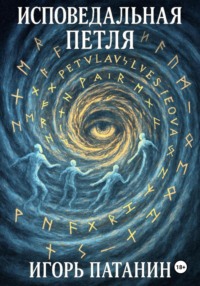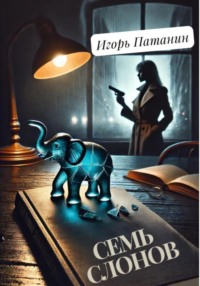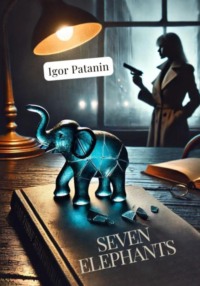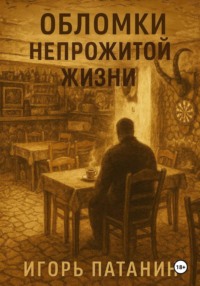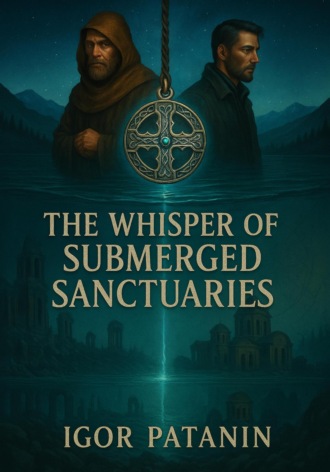
Полная версия
The Whisper of Submerged Sanctuaries
They walked side by side, maintaining their distance. The air between them seemed filled with unspoken words. Alexei searched for a way to start a conversation, but everything felt inappropriate or banal.
"You've changed a lot," Dinara said unexpectedly as they approached her car—a small blue Toyota. "You look… sterner."
Alexei smirked.
"And you're still the same," he replied.
It was a lie. She had changed. Become more confident, more reserved. During their student years, Dinara had been open and impulsive, always ready to argue and defend her point of view. Now there was a kind of inner strength and calmness about her that hadn't been there before.
They got into the car, and Dinara confidently steered out of the parking lot. They drove in silence for several minutes. Finally, Alexei couldn't stand it and asked:
"How is your grandfather? Is he still alive?"
"Yes, he's alive," Dinara nodded. "He's 84 now, but still a sturdy old man. Lives in a village near Issyk-Kul. Grows apples and keeps a bee farm."
"I'd like to meet him."
Dinara gave him a quick glance.
"That might be arranged. But first, tell me what you found."
Alexei hesitated. On one hand, he had come specifically for this—to share his discovery and get help. On the other—something made him cautious. Perhaps it was Dinara's strange warning on the phone, or simply the years spent in academia, where one always needed to protect one's research from competitors.
"I'll show you when we're in a secure place," he finally said.
Dinara braked sharply at a traffic light and turned to him.
"You don't trust me?" There was more surprise than offense in her voice.
"It's not that," Alexei rubbed his temple. "It's just… my grandfather warned me to be careful. And you said something similar on the phone."
The light turned green, and Dinara focused on the road again.
"All right," she said after a pause. "First, we'll go to the museum. I have an office where we can talk privately."
They drove the rest of the way in silence. Alexei looked out the window at Bishkek. It was a modern city with new buildings, billboards, and wide avenues. But what distinguished it from other similar cities Alexei had visited was the abundance of greenery and the mountains on the horizon.
Finally, they arrived at the Historical Museum building—an imposing structure of Soviet architecture with a wide marble staircase. Dinara parked in the staff parking area and led Alexei through a side entrance.
"This wing houses the restoration workshops and staff offices," she explained, swiping her card through an electronic lock. "I have a small office on the second floor."
They climbed the stairs and walked down a corridor lined with shelves stacked with cardboard boxes and wooden crates. Dinara stopped at one of the doors and took out her keys.
Her office turned out to be a small but cozy room with a window. Bookshelves filled with academic literature, a desk with a computer, and maps of Central Asia and photographs of archaeological excavations on the walls. In the corner stood a small sofa and a coffee table—evidently a place for relaxation and conversations with colleagues.
"Make yourself comfortable," said Dinara, pointing to the sofa. "Would you like some tea? I have an electric kettle."
"Thank you, I wouldn't mind."
Dinara switched on the kettle and sat opposite Alexei, folding her hands in her lap.
"Now we can talk calmly. What did you find in your grandfather's archive?"
Alexei took a deep breath and removed the medallion on a chain from the inner pocket of his jacket. The silver disc gleamed in the sunlight streaming through the window.
"This." He placed the medallion on the table between them. "According to my grandfather's diary, this artifact was found during the expedition to Issyk-Kul in 1954. Your grandfather, then just a boy, helped with the expedition and seems to have been somehow connected to this find."
Dinara examined the medallion with evident interest, but without touching it.
"My grandfather did indeed often talk about the 1954 expedition. He lived with his parents in a village near the excavation site and helped the scientists as a guide." She raised her eyes to Alexei. "But he never mentioned any medallion."
Alexei nodded.
"In my grandfather's diary, there's an entry where he decided to hide the find from his superiors. And that your grandfather said the medallion 'wanted to stay' with him."
Dinara smiled slightly.
"That sounds like my grandfather. He always had a special sense for ancient things. He said they 'spoke' to him."
The kettle clicked off. Dinara stood to prepare the tea. Her movements were fluid and precise, like someone accustomed to working with fragile artifacts.
"Did you open it?" she asked without turning around.
"Yes," Alexei replied. "Inside was a parchment with an inscription in Latin and something like a fragment of a map. 'Lux in aqua, aqua in luce. Clavis Salomonis aperiet viam.' Light in water, water in light. Solomon's key will open the way."
Dinara froze for a moment, then slowly turned to him. Her face had become serious.
"Solomon's key," she repeated. "That's interesting. In our region, there are legends about sacred artifacts hidden in the waters of Issyk-Kul. Some of them are connected to the Nestorians who fled from the Mongols in the 13th century." She placed a cup of tea in front of Alexei. "But I've never heard of a 'Solomon's Key' in this context."
Alexei sipped the hot tea—strong and sweet, as is customary in Central Asia.
"I studied this matter before my trip. The 'Key of Solomon' in Western tradition is a grimoire, a book of spells attributed to King Solomon. But judging by the context, this refers to some physical object."
"Perhaps it's a metaphor," Dinara suggested. "Or…" she fell silent, as if contemplating something.
"Or?" Alexei prompted.
"Or it's indeed some artifact, so valuable that our grandfathers chose to conceal its existence from the authorities."
She finally took the medallion and began to study it carefully, turning it in her hands.
"Undoubtedly Nestorian work. The cross is of a characteristic shape, and the ornament is also typical of their art. But the symbols on the reverse side…" she frowned. "They resemble Syriac script, but with elements I cannot identify. Possibly some secret code or font known only to initiates."
She placed the medallion back on the table.
"I need to show this to my uncle Ermek. He's the custodian of the nature reserve on the northern shore of Issyk-Kul, right where the excavations took place in 1954. And he's a great specialist in local folklore and history."
"That would be great," Alexei nodded. "When can we meet him?"
Dinara glanced at her watch.
"I can call him right now. If everything works out, we could head to the lake tomorrow morning. It's about a four-hour drive from Bishkek."
She took out her phone and stepped into the corridor to talk. Alexei remained alone in the office. He looked around, examining the books on the shelves and the photographs on the walls. In one of them, Dinara stood next to a tall middle-aged man with the characteristic appearance of local residents—presumably the uncle Ermek.
Alexei's gaze fell on a stack of documents on Dinara's desk. On top lay some printout in Kyrgyz with a logo resembling a coat of arms or emblem. He couldn't read the text but noticed that several lines had been highlighted with a marker.
Next to the computer lay a small voice recorder. The red indicator on it was blinking, showing that it was recording. Alexei frowned. Why was Dinara recording their conversation? And why hadn't she told him about it?
He quietly approached the desk and turned off the recorder, then returned to the sofa just as the door opened and Dinara re-entered the office.
"Good news," she said with a smile. "Uncle Ermek will be happy to see us. He's currently in Cholpon-Ata, a town on the northern shore of the lake. We can leave early tomorrow morning and be there by lunchtime."
Alexei nodded, trying not to show his concern about the recorder.
"Great. What about your grandfather? Will we be able to meet him?"
Dinara frowned slightly.
"Grandfather isn't feeling very well right now. Age is taking its toll. But I asked Uncle Ermek, and he thinks a visit might be possible if Grandfather feels better."
She sat down opposite Alexei again, taking her cup of tea.
"Now it's your turn," she said. "Tell me more about how you found the medallion and what else was in your grandfather's archive."
Alexei gave a detailed account of the folder's contents, the diary, photographs, and the note his grandfather had left specifically for him. He omitted only his suspicions about the voice recorder—first, he needed to understand what was happening.
"It's strange that your grandfather kept this secret for so many years," Dinara remarked when he finished. "Apparently, he believed the medallion might be dangerous or lead to something dangerous."
"Yes, and that concerns me," Alexei admitted. "My grandfather wasn't prone to exaggeration or mysticism. If he felt it necessary to warn me, he must have had serious reasons."
Dinara thoughtfully twirled her cup in her hands.
"There are many legends about cursed treasures and mysterious artifacts at Issyk-Kul. The lake holds many secrets." She placed her cup on the table. "But as scientists, we should approach such stories skeptically, right?"
Alexei nodded, though deep down he felt there was something more to this story than just local legends.
"Of course. But I'd like to know what was so special about this medallion that my grandfather concealed it his entire life."
Dinara looked at him intently.
"Did you really come here solely out of scientific interest? Or is there something else?"
The question caught Alexei off guard. He hesitated, choosing his words.
"I… don't know. It's probably a combination of factors. Scientific interest, certainly. Respect for my grandfather's memory. The chance to see you again…" he faltered, unsure whether it was appropriate to mention their past relationship. "And, honestly, some financial difficulties. An archaeologist's salary in Russia leaves much to be desired."
Dinara nodded, as if his answer confirmed her suspicions.
"I understand. Many come to Issyk-Kul hoping to find treasures. Legends of sunken cities and immense riches attract fortune seekers from all over the world."
Alexei thought he detected a slight disappointment in her voice, and he felt the need to defend himself.
"I'm not a treasure hunter, Dinara. I want to understand what my grandfather found and why it was so important to him."
She sighed and softened.
"I'm sorry. I didn't mean to accuse you. It's just… I've seen how treasure hunting changes people, and not always for the better."
They sat in silence for a while. The sun had begun to set, and shadows gradually deepened in the office. Finally, Dinara stood up.
"It's getting late. I'll drive you to the hotel. And tomorrow early morning, we'll head to the lake. It's quite a journey, so I advise you to rest well."
Alexei also rose, discreetly returning the medallion to his inner pocket.
"Thank you again, Dinara. Really."
She smiled faintly.
"You're welcome. After all, our grandfathers were connected by this secret. Perhaps we're destined to solve it together."
They left the museum, and Alexei suddenly felt a strange sensation, as if someone was watching them. He looked around but noticed nothing suspicious among the passersby and parked cars.
When they got into Dinara's car, he asked:
"By the way, who else knows about my arrival and the medallion?"
Dinara fastened her seatbelt and started the car.
"Only Uncle Ermek. I told him you came with some find related to the 1954 expedition, but without details." She drove out of the parking lot. "Why do you ask?"
Alexei shrugged, looking in the side mirror.
"Just a strange feeling. As if we're being watched."
Dinara tensed but remained silent. After a few minutes, she turned onto a busy avenue and said:
"You know, let's go have dinner first. I know a good place not far from here. We can also talk about tomorrow's trip."
Alexei agreed, though he noticed that Dinara checked the rearview mirror several times, as if she too sensed someone's presence.
The restaurant turned out to be a small, cozy establishment serving national cuisine. They sat at a table in the corner with a good view of the entrance. After ordering pilaf and tea, Dinara leaned toward Alexei and said quietly:
"Your instincts might not be wrong. Lately, there's been a lot of… interested parties circling around historical artifacts, especially those connected to Issyk-Kul."
"What do you mean?" Alexei asked, equally quietly.
"After the collapse of the USSR, many archives and repositories were left without proper security. Valuable artifacts disappeared, documents were lost or stolen. Now these items are surfacing on the black market or in private collections." She paused as the waiter brought tea. "And in recent years, one person has been particularly actively interested in everything related to Issyk-Kul antiquities."
"Who?"
"Timur Karabaev. A local oligarch who made his fortune in the mining industry. He finances archaeological expeditions, buys artifacts, creates private museums… At first glance, everything is legal and even noble. But rumors suggest many of his methods are far from ethical."
Alexei frowned.
"And you think he might know about the medallion?"
"I don't know. But he maintains close ties with the museum management and sponsors many of our projects." She fell silent when the food arrived and continued only after the waiter had left. "Perhaps it's just a coincidence. But be careful, Alexei. Don't show the medallion to anyone except my uncle."
They began eating, but Alexei had lost his appetite. Dinara's words made him wary. What if his grandfather was right and the medallion could indeed lead to something dangerous? What if someone was really following them now?
He discreetly surveyed the restaurant. Regular patrons, families, couples, groups of friends. Nothing suspicious. And yet the feeling of anxiety wouldn't leave him.
"If you're afraid, we can cancel the trip," said Dinara, noticing his concern. "The medallion has remained secret for decades. It can wait a bit longer."
Alexei shook his head.
"No. I want to know the truth. My grandfather entrusted me with this secret not so I could hide it back in the archive."
Dinara looked at him with respect.
"Then we'll go tomorrow. But we'll be careful."
After dinner, they drove to the hotel. It was a modest but clean establishment in the city center. Dinara helped Alexei check in and accompanied him to his room. At the door, she hesitated, as if wanting to say something but changed her mind.
"I'll pick you up tomorrow at seven in the morning," she said. "Be ready."
"Thank you again," Alexei replied. "For everything."
She nodded and turned to leave but suddenly stopped and looked at him over her shoulder.
"You know, I'm glad you came. Despite everything."
With these words, she left, leaving Alexei at his room door with the feeling that tomorrow would change everything.
Inside, the room proved simple but comfortable. Alexei locked the door and, for good measure, propped a chair against it. Then he took out the medallion and placed it on the bedside table. The silver disc gleamed in the lamplight, as if winking at him.
"What are you hiding?" Alexei thought, looking at the ancient artifact. "And is the solution worth the dangers it might bring?"
But he already knew the answer. He hadn't come here to turn back. Tomorrow they would head to Issyk-Kul, and perhaps the secret preserved for centuries would finally be revealed.
Alexei lay down on the bed, fully clothed, and closed his eyes. Sleep was long in coming, and when it finally arrived, he dreamed of labyrinths of underground caves filled with water, and an ancient monk who persistently told him something in an unfamiliar language, pointing to a silver medallion hanging around his neck.
Chapter 3: The Pursuit
Dinara pulled up to the hotel at exactly seven in the morning. Alexei was already waiting at the entrance with a small backpack. He had slept poorly, plagued by strange dreams, and looked somewhat disheveled. However, the anticipation of the journey to the lake gave him energy.
"Good morning," said Dinara, opening the car door. Today she was dressed in practical clothing—jeans, a plaid shirt, and a light jacket. Her hair was pulled back in a tight ponytail. "Ready for the journey?"
"More than ready," Alexei replied, tossing his backpack onto the back seat.
Dinara handed him a paper cup of coffee and a paper bag.
"Here. Coffee and meat samsa. A traveler's breakfast."
"Thanks," Alexei smiled, accepting the offering. "You've thought of everything."
"It's quite a journey," Dinara shrugged, merging into the morning traffic. "Four hours at best, if there's no congestion leaving the city."
They drove in silence for a while. Alexei chewed on the samsa—a flaky pastry with meat filling—and watched as Bishkek gradually gave way to suburbs and then rural countryside. In the distance, the mountain ranges of the Tian Shan were visible, shrouded in morning mist.
"Tell me," Alexei finally broke the silence, "what do you know about this Karabaev?"
Dinara gave him a quick glance.
"Not as much as I'd like. In the '90s, he started with a small business, then somehow gained control of several gold mines. Now he's one of the wealthiest men in the country, has connections in the government, finances cultural projects." She hesitated. "But rumors suggest he made his first millions smuggling antiquities to Europe and China."
"And he's interested in the archaeology of Issyk-Kul?"
"Not just interested. Obsessed with it." Dinara changed lanes, overtaking a slowly crawling truck. "For the past five years, he's been financing expeditions, bringing in foreign specialists, building a collection of artifacts. They say there's an entire museum in his mansion near Cholpon-Ata."
"Sounds like an enthusiastic collector," Alexei remarked.
"Perhaps," Dinara didn't look convinced. "But my uncle Ermek isn't impressed with his methods. He says Karabaev is only interested in certain types of artifacts, especially those connected with Nestorians and ancient treasures. He doesn't care about anything else."
Alexei pondered this. It could be a simple coincidence, but the fact that a local oligarch was specifically interested in Nestorian artifacts seemed suspicious.
"Do you think he might have somehow learned about the medallion?"
Dinara shrugged.
"I don't know. But he definitely has connections at our museum. The director regularly dines with him and receives generous donations for 'the development of historical research.'" She made air quotes with her free hand.
They drove onto the highway leading to Issyk-Kul. The road gradually ascended into the mountains. On both sides stretched green meadows, with occasional yurts and flocks of sheep grazing. The scenery became increasingly picturesque.
"How beautiful," Alexei couldn't help saying. "Like something from a fairy tale."
"Yes," Dinara smiled. "I missed these places when I was studying in St. Petersburg. No matter how many beautiful palaces and parks I saw, nothing compares to our mountains and Issyk-Kul."
A light nostalgic smile appeared on her face. For a moment, Alexei saw in her the girl he had fallen in love with during their student years—open, dreamy, full of enthusiasm. But the moment quickly passed, and she became composed and slightly detached again.
They passed a road police checkpoint, where Dinara showed some documents, and the officer, after glancing at them, saluted and waved them through. Alexei raised an eyebrow in surprise.
"Museum ID," Dinara explained. "It provides certain privileges on the roads, especially if you're heading to the nature reserve."
After an hour, the road began to wind between mountain slopes, climbing toward a pass. Traffic became less busy. Occasionally, cars or small trucks passed in the opposite direction, but mostly the road was deserted.
Alexei noticed a black SUV in the rearview mirror, following them at some distance. At first, he didn't pay much attention, but then he noticed: when Dinara reduced speed, the SUV repeated their maneuver. A feeling of unease stirred in his chest.
"Dinara," he said quietly, "have you noticed that black jeep has been following us for some time now?"
Dinara cast a quick glance in the mirror and tensed slightly.
"I noticed it when we left Bishkek," she admitted. "But I didn't want to worry you. It might just be a coincidence."
"Or it might not be," Alexei murmured. "Let's check."
"How?"
"At the next turn, brake suddenly, as if you've seen something on the road. If they also brake without reason, then they're definitely following us."
Dinara nodded. A few minutes later, when the road made another turn around a rocky outcrop, she suddenly hit the brakes. The car jerked and stopped. Alexei turned around and through the rear window saw that the black SUV had also braked sharply, maintaining a significant distance from them.
"Well, there we have it," he said. "It's not a coincidence."
Without a word, Dinara started moving again, but now drove noticeably faster.
"Who do you think it could be?" Alexei asked.
"I don't know for sure," she answered, gripping the steering wheel tightly. "But I have my suspicions."
"Karabaev's people?"
She nodded.
"Possibly. He has eyes and ears everywhere."
Alexei felt the medallion hanging around his neck under his shirt seem to grow heavier.
"What are we going to do?"
"We'll try to lose them. I know these roads better than they do," Dinara said confidently. "Hold on."
She sharply turned onto a side road that Alexei hadn't even noticed—a narrow dirt track veering away from the main highway. The car shook on the uneven surface, but Dinara, without reducing speed, confidently steered between shrubs and scattered trees.
"This is an old road," she explained. "Local residents sometimes use it. Tourists don't know about it."
Alexei held onto the handle above the door, trying not to bounce too much on the bumps. After a few minutes, Dinara turned again, this time onto an even narrower path that seemed about to disappear among the dense vegetation.
"Are they still following us?" she asked, not taking her eyes off the road.
Alexei looked back but didn't see any pursuers.
"Doesn't look like it. It seems we've lost them."
"Don't relax," Dinara shook her head. "It won't be for long. If they're really watching us on Karabaev's orders, they have resources. Possibly even a helicopter."
She continued zigzagging along mountain roads, clearly trying to confuse their trail. Finally, they emerged at a small village consisting of several dozen houses arranged along a single street.
"Where are we?" asked Alexei.
"This is where my cousin Bakyt lives," Dinara replied, slowing down. "We can stop at his place, wait a while, and change our route."
She turned into the yard of one of the houses. It was a modest single-story structure with a large garden where apple and apricot trees grew. An old UAZ with peeling paint stood by the gate.
A sturdy middle-aged man emerged from the house, clearly surprised by their arrival. He said something to Dinara in Kyrgyz, and she quickly replied. The man nodded and gestured for them to enter the house.
"Bakyt says we can stay here for a while," Dinara translated. "He suspects his house is being watched, but not from the road—from the direction of the mountains."
"Watched? Why?" Alexei frowned.
Dinara and Bakyt exchanged a few phrases.
"He says strangers have been appearing in the village in recent weeks. Asking about old caves, archaeological finds, local legends. Offering money for information." She paused. "And they were especially interested in our family. My grandfather, uncle Ermek, and… me."
Alexei felt a chill run down his spine.


